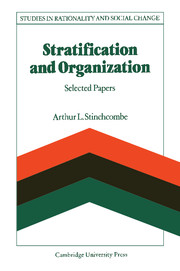Book contents
- Frontmatter
- Contents
- Acknowledgments
- 1 Rationality and social structure: an introduction
- PART I STRATIFICATION
- 2 Agricultural enterprise and rural class relations
- 3 Some empirical consequences of the Davis-Moore theory of stratification
- 4 Interdependence and inequality: a specification of the Davis-Moore theory (Co-authored with T. Robert Harris)
- 5 Marxist theories of power and empirical research
- 6 Social mobility in industrial labor markets
- 7 The sociology of ethnic loyalties
- 8 The deep structure of moral categories, eighteenthcentury French stratification and the Revolution
- PART II ORGANIZATIONS
- PART III SOCIOLOGY AS A PROFESSION
- Bibliography
- Name and place-name index
- Subject index
7 - The sociology of ethnic loyalties
from PART I - STRATIFICATION
Published online by Cambridge University Press: 06 July 2010
- Frontmatter
- Contents
- Acknowledgments
- 1 Rationality and social structure: an introduction
- PART I STRATIFICATION
- 2 Agricultural enterprise and rural class relations
- 3 Some empirical consequences of the Davis-Moore theory of stratification
- 4 Interdependence and inequality: a specification of the Davis-Moore theory (Co-authored with T. Robert Harris)
- 5 Marxist theories of power and empirical research
- 6 Social mobility in industrial labor markets
- 7 The sociology of ethnic loyalties
- 8 The deep structure of moral categories, eighteenthcentury French stratification and the Revolution
- PART II ORGANIZATIONS
- PART III SOCIOLOGY AS A PROFESSION
- Bibliography
- Name and place-name index
- Subject index
Summary
By national or ethnic loyalty we mean the identification by an individual of his or her interests with the interest of a nation or ethnic group. A person is loyal if he or she is willing to sacrifice some personal interests for the sake of group interests. This often is caused by a persons's belief that the group interests are truly his or her personal interests rather than by any special altruism. Thus nationalism is in part a belief system which asserts that one's own interests are promoted by the promotion of the group and are damaged by damage to the group.
But often, perhaps usually, there is really no cognitive separation between individual and group interests, so ‘belief system’ is too flattering a word. ‘Of course we have to resist invasion’ – this leaves the ‘we’ unanalyzed, a part of the natural order of things, a natural subject of the verb ‘have to.’ The analogies that naturally occur to people defending the national draft against pacifists are family analogies: ‘Wouldn't you kill a man to defend your mother from being raped?’ The assumption that the ‘we’ of a nation is like the ‘we’ of a family is implicit in this argument. What we want to do here is to develop a theory of the social conditions under which such unanalyzed ‘we’ concepts come to be the natural subject in sentences about political values and policies.
- Type
- Chapter
- Information
- Stratification and OrganizationSelected Papers, pp. 122 - 144Publisher: Cambridge University PressPrint publication year: 1986

